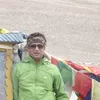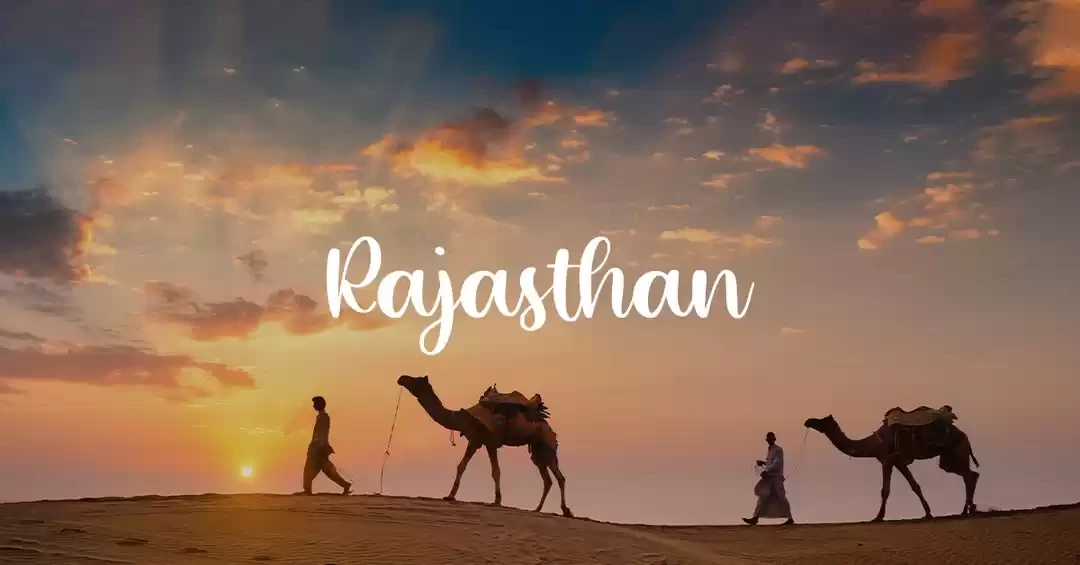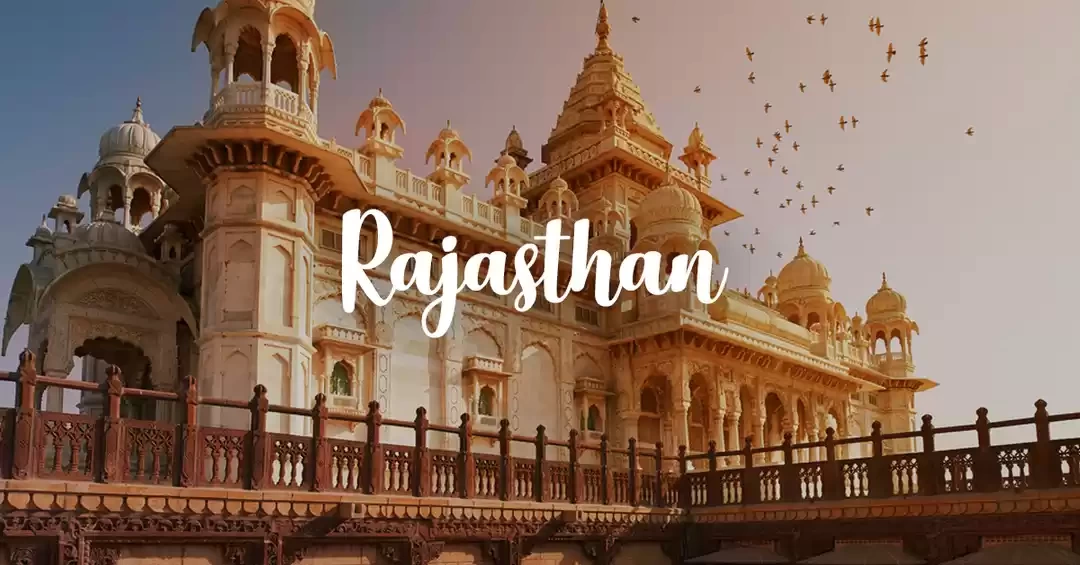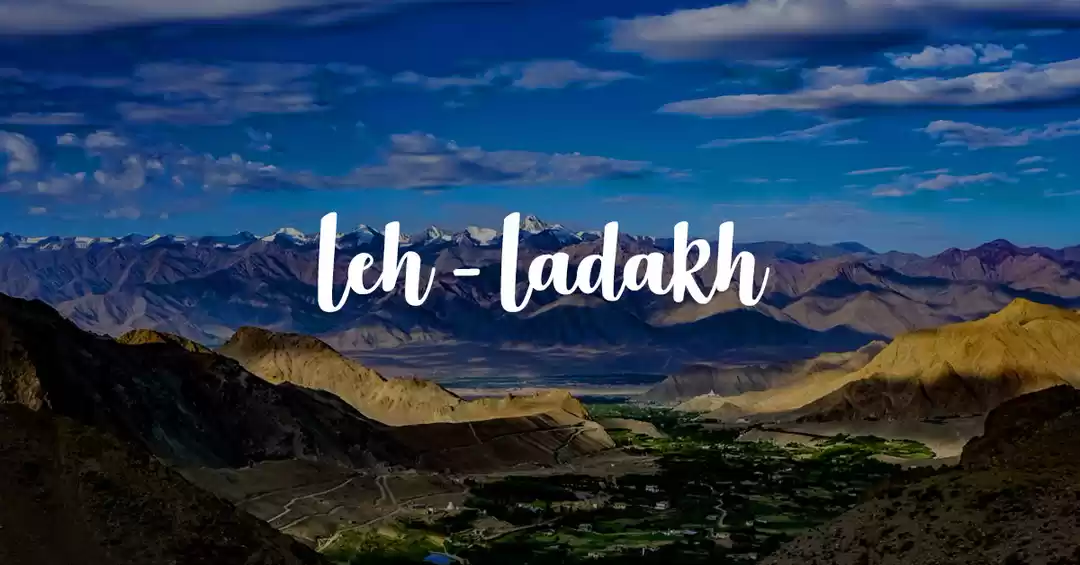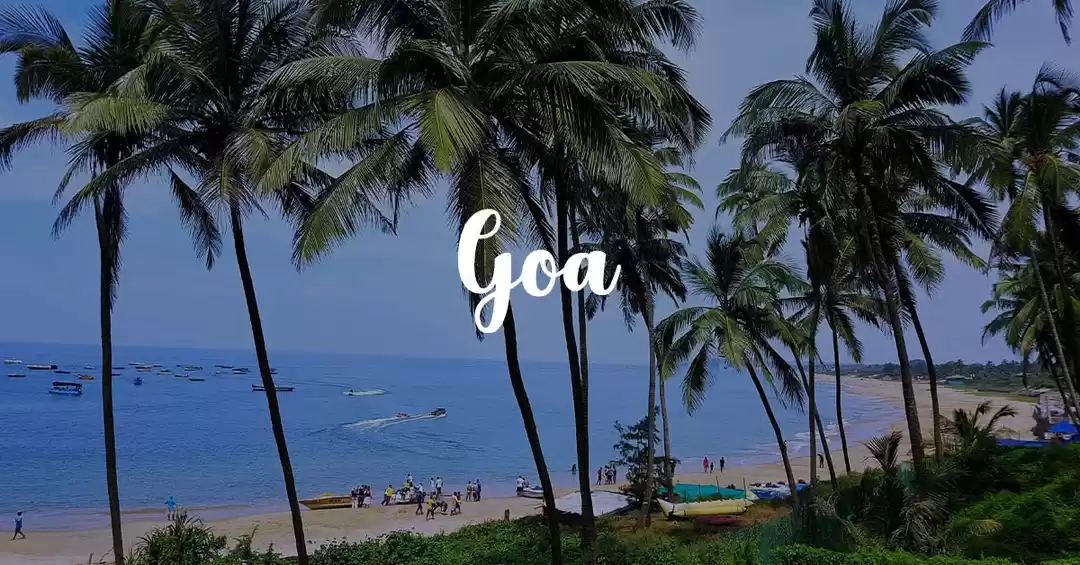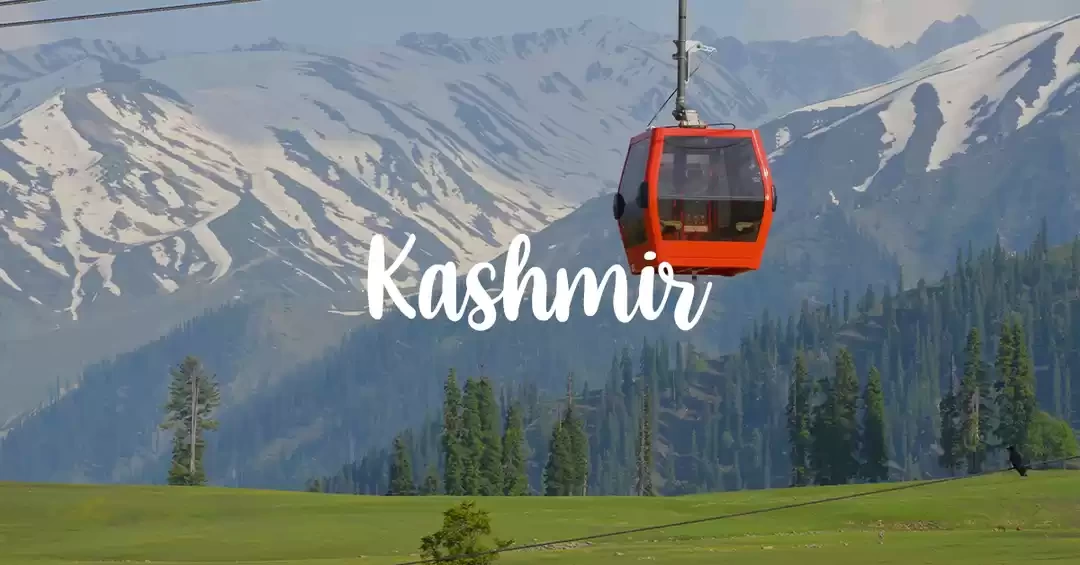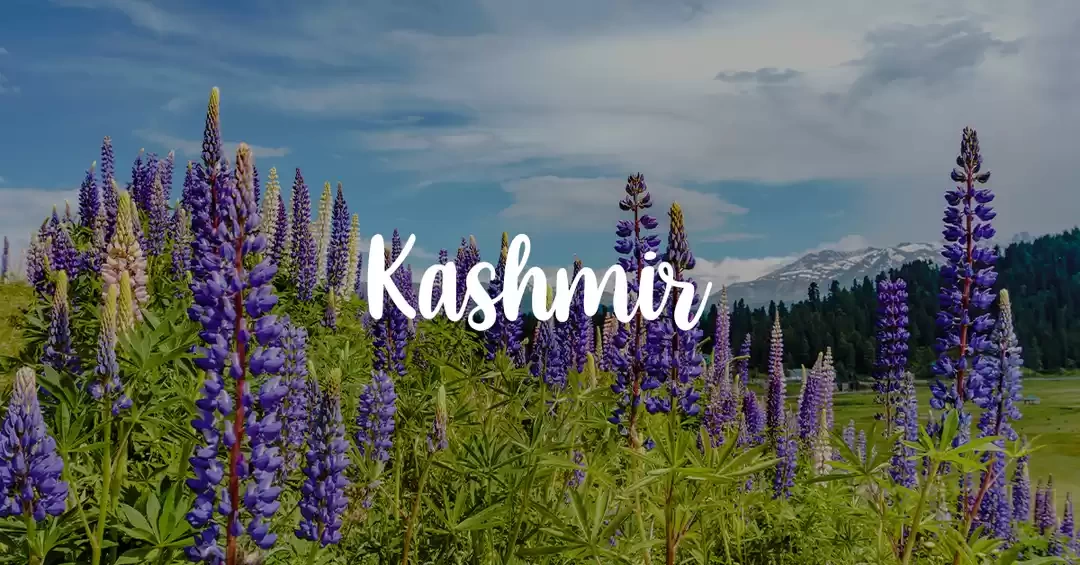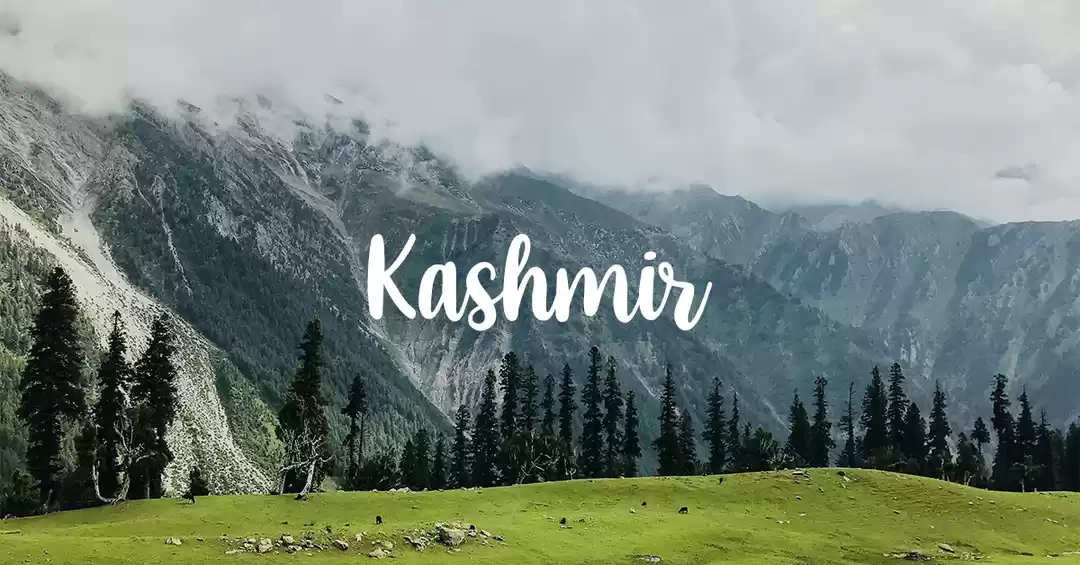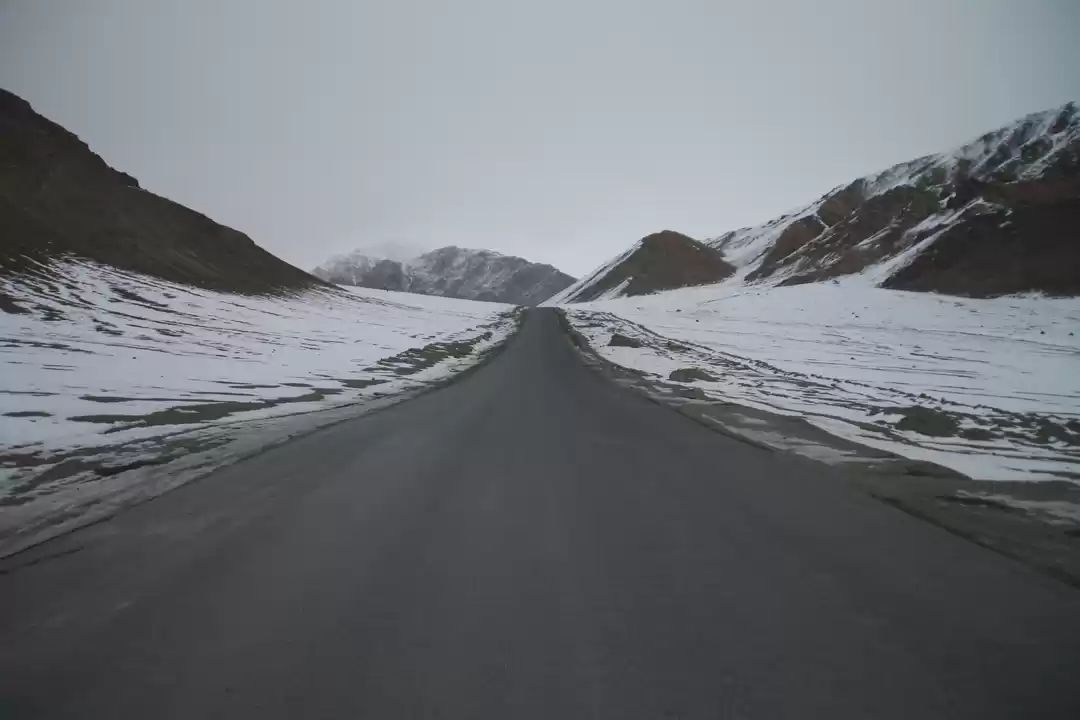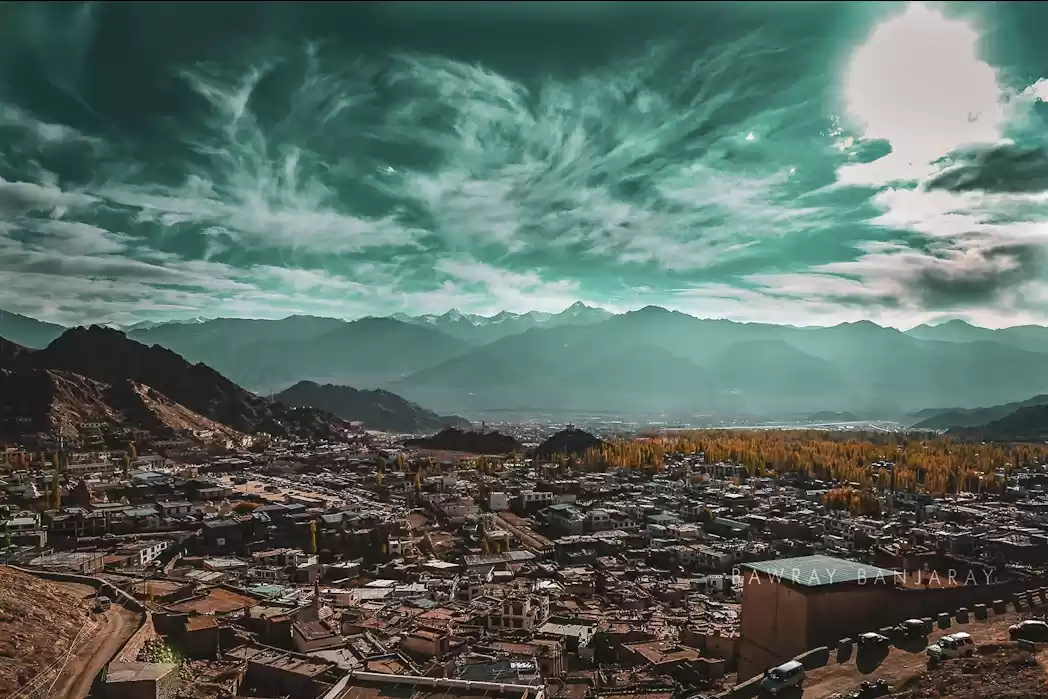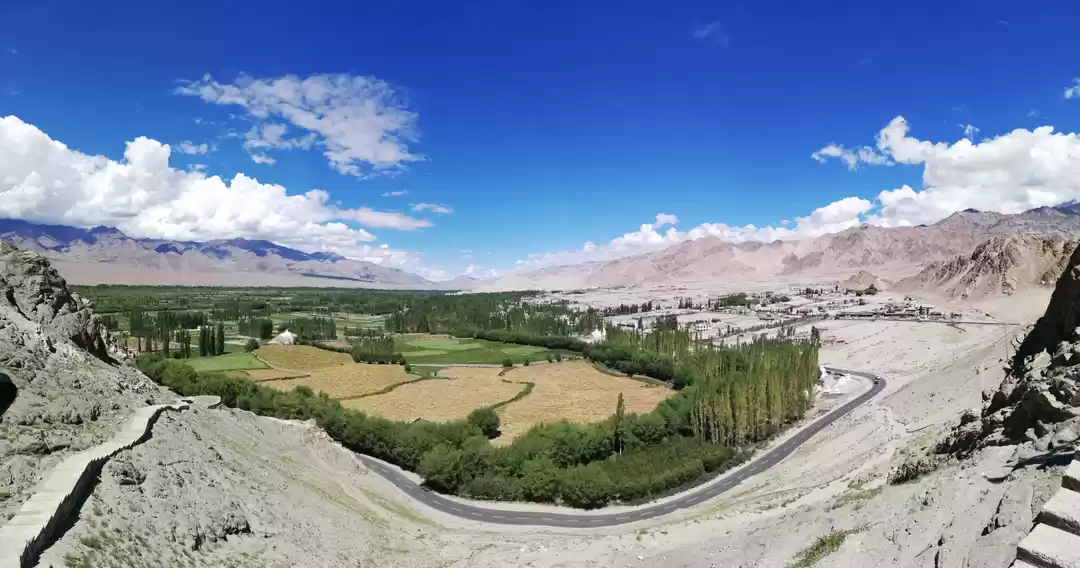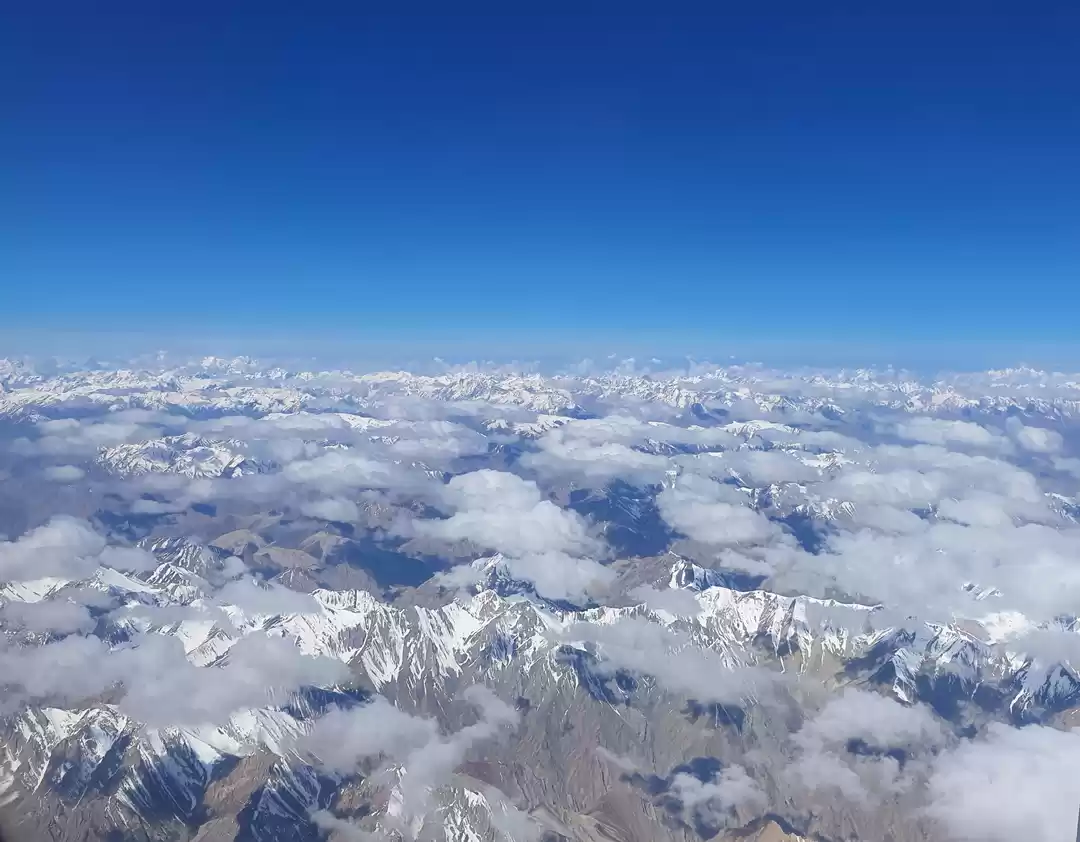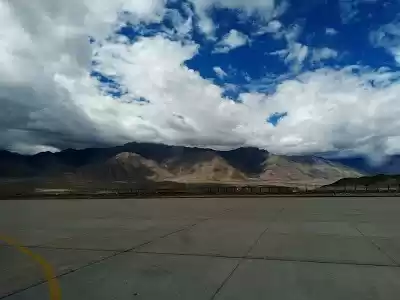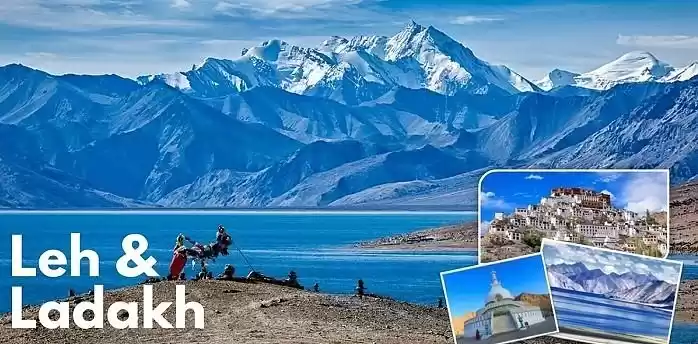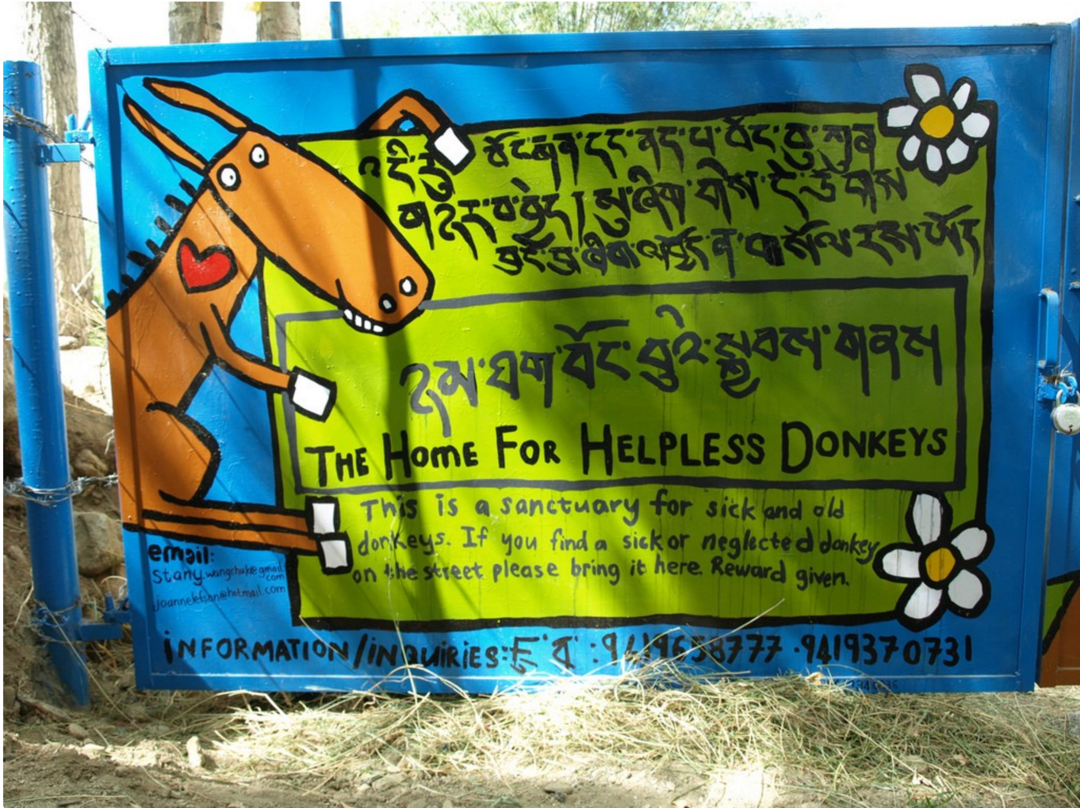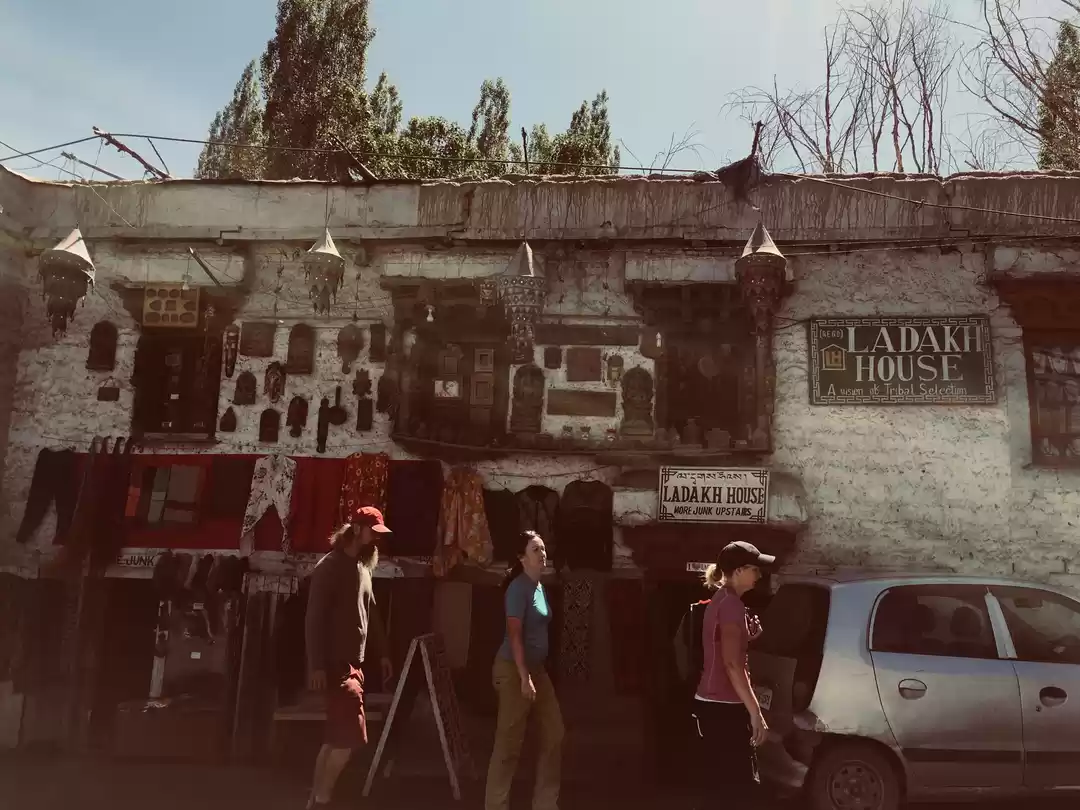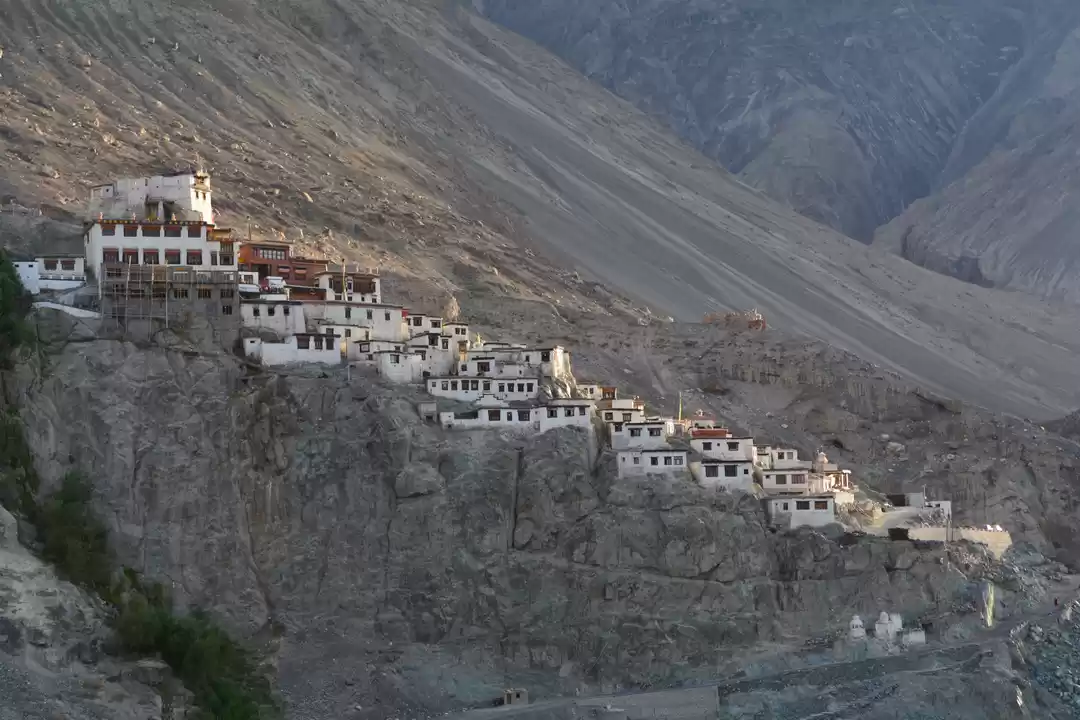
It was a beautiful morning in Kathmandu. I had an afternoon Air India flight to New Delhi from where I fly to Leh the next morning. I was staying at the Oasis Kathmandu Hotel, which was a kind of lifestyle upgrade to me in Nepal. I had spent almost two months in this country in 2005 taking a sabbatical from my exhaustive corporate life in New Delhi. I was, back then a new generation hippie in Kathmandu. That is altogether a different story and perhaps I will be able to write a story someday on that. I decided to take a walk out of the hotel. The familiar buzz of morning traffic, fumes mixed with incense, the business of souvenir shops and touts rushing to my eyes through a maze of prayer flags. Kathmandu as I knew was presenting itself to me.
After toying with the idea of breakfast on the streets and deciding against it, I headed back to my hotel for my usual continental buffet breakfast. Leh was on my mind now. Time to catch a flight.

So here I am, this morning at the end of September, at the Kusok Bakula Rimpochee Airport in Leh. At 3256 meters, this airport overlooks the Spituk Monastery. The airport is named after Kusok Bakula Rimpoche, who was an ambassador for India in Mongolia and happened to be a monk in Spituk. Every time I check-in and out of this airport I usually am extra cautious. The airport security is very tight due to its strategic location and somehow hand luggage is not allowed here. It is a pilot's skill test zone. Due to the altitude of the airport, it faces a lot of head and tailwinds in the afternoon, and hence all flights land and take off in the morning. It is always a happy feeling in Leh. There is something very holy about these mountains.

I had intended to spend ten days in Ladakh this time, which technically means eight days. The first two days have to be complete rest days, as one need to acclimatize to the reduced oxygen levels in Ladakh. Of late, I heard of many Ladakh stalwarts perish to Acute Mountain Sickness on arrival. So I am not taking any chances, I am going to sleep away to glory today. It is an amazing feeling to take yourself under a blanket without even a fan to cool you. It is late September and the wind especially after sunset can take the chill to your bones.
Read about the severity of acute mountain sickness or AMS in Ladakh
Ever since I started my business travel to Ladakh, I go through Himalayan Crossroads, a travel agency run by Tsetan Angchuk in Leh. Tsetan also happens to be the current president of All Ladakh Tour Operators(ALTO) and my good friend. He gets the complicated things done for me in Ladakh. This time the complication started with securing accommodation for me at Saboo Resort. A film crew from Mumbai with trendy names had booked the entire resort and I was intransigent. I have to stay in Saboo, if not for anything else, but for the food. Angchuk managed to get me a cottage there at Saboo resort, though not on my favorite piece of land on the property, but with all the usual works. And lo behold! The familiarity of places and faces began. Ladakhis had a great quality - their faith in humanity and God. This helps them forgive easily. Odpal Dejor George, the owner of Saboo Resorts, forgave my resoluteness in the blink of an eye and our casual welcome note progressed with practiced familiarity. George happens to be a line producer and is a regular in Mumbai. Any production house needing local logistic support in Ladakh, George was the go-to man.

So after an early lunch at Saboo Resort, I slept away till dinner only to sleep again. The last week was rush hour for me and somehow I made peace with my sleep here in Ladakh.
Although I had another time off day, I intended to take a small drive to meet my friend Rupankar Chaliha. He is from Guwahati and had opened up a backpacker's hostel in Leh. I needed his interview for my current assignment. Ladakh in a month would be declared a union territory and the mood was upbeat. Strange though, a substantial amount of tourism and allied business originates from Kashmiris staying in Srinagar and of course all across the country wherever they are.
The next day after breakfast, I took a taxi to Leh. Saboo resort is fifteen minutes away from Leh market, on the Leh -Keylong Road in Saboo village. Rupankar Chaliha had set up his hostel on the fringes of SNM hospital in Leh. It is called the Happy Drifter's Leh and is quite popular. We set the conversation going on and here is the full interview:
Rupankar Chaliha on his stepping into Ladakh

BTS: What kind of destination do you think is Ladakh?
Rupankar Chaliha: Ladakh is more often called an adventure destination. But I guess it has more to offer tourists then only adventure. It's a place where one can reconnect with nature.
BTS: Why did you choose Ladakh as your place of business?
Rupankar Chaliha: As I said Ladakh happened by chance. I had never been to Ladakh before HD started. It was Arpan who gave me Ladakh as an option, and rest, as they say, is history. The moment I landed in Ladakh, this place seemed like my second home. From a business point of view, if you look at India in the world map, there are only a few places that will come to your mind- Goa or Kerala or Ladakh. The influx of tourists both national and international has been very high in Ladakh in recent years. As it's a tourist place, the travel and tourism sector get very good support from the government.
BTS: Do you think we are pushing Ladakh towards a mass tourism destination?
Rupankar Chaliha: Yes, I strongly agree with this and we as travel agents have to play a very important role to help Ladakh maintain its ecology which over the years has been hugely affected.
BTS: What is Happy Drifter's and how is it like "drifting" in Ladakh?
Rupankar Chaliha: Happy Drifters is a chain of budget-friendly traveler hostels providing food/ lodging/tours to solo and budget travelers.
BTS: Why is Ladakh "a point of arrival" for most Indian adventure seekers?
Rupankar Chaliha: Actually it is Leh to be precise. Ladakh is a UT now and Leh is one of its major towns. It's the arrival point because all the other destinations are easily accessible from Leh and the only airport of Ladakh is in Ladakh.

After leaving Happy Drifter's I headed to the main bazaar in Leh. A cup of coffee is necessary in any of the rooftop restaurants in Leh. Leh has tons of restaurants and café catering to all sorts of preferences. Although one of my favorite hangout zones had been the Gesmo Restaurant in Tall Fort Road, opposite to Hotel Yak, I decided to try something else today. Gesmos was slow in service but very good with food. Since I was not hungry, I was not in the mood for bad service and it is not a rooftop one that I was keen on today. I walked down the Main Bazaar road, which was under construction last time I was here. The markets were thin as most of the Kashmiris who owned shops here moved to Goa where the season has started. Ladakh end in Goa start. It was the last week of September and the tourists were fading out in Ladakh. It is mostly complex travelers like me to visit Ladakh during this time. Some for business, some to save money.
I eyed a new café - Lehvenda Café on the second floor of Megon Complex and decided to park myself there for some time. The ambiance looked well, the girl in the counter pleasant and some friendly locals inside. It was opposite to Brasil Café, another of my favorite places in Leh. As I waited for my coffee and sandwich, a string of thoughts ran through my mind and my eyes swayed from places to people down below on the street. The charity was running behind schedule and although some of our overseas fundraisers achieved their purpose, our main fund-raising events in Australia battled with volume. We were in the process of building a new school in Rangdum in Zanskar Valley. Zanskar Valley is in the east of Ladakh. In a couple of days, I will assess the fund requirements in Leh before I proceed to Nubra valley. Life is slightly complicated when you have work in your mind in Ladakh. Well, sipping my coffee, which was quickly turning cold, I saw a group of school children on a cleanliness mission on the street. They were carrying brooms and garbage bags and of course a banner. The white clouds laced the hills beyond the villages, as far as I can see them. A worn-out foreigner with a guitar and a backpack seemed a little lost. A toddler walked with his mother to an Automatic Teller Machine booth. This street is lined with quite a number of these ATMs. I am glad most of my favorite cafes here like the Lamayuru Restaurant, Chopsticks and the Tibetan Kitchen accept cards. I hate to carry cash, I tend to lose track of my expenditures. Using a card is healthy for me, the shock is just once a month.
And the next day my driver takes me to Lamdon School, where I had to meet some locals and discuss on my current assignment. Afternoon, I would be meeting Arpan Kalita for a late lunch. Arpan is conducting a night photography workshop in Nubra Valley and is arriving in Leh today. Well if Khardung La pass is kind to him and allows him a snow-free passage, lunch awaits him or else he has to go hungry till dinner. Well, fortunately, for everyone Khardung La was tamed and seemed to be in a happy mood today. Arpan arrived on time.

The meeting in the school was as expected resourceful and I explained to our team in Leh how things were materializing. We were on one page when it comes to prioritizing the Zanskar project. The direction of my conversation was simple. We needed to utilize resources whatever was available to people who needed most. And anyone who came out of the needy curve had to give way to the more needy ones. We were going to make future efforts to enlist more sponsors but that will take some time. We were ready to share. 'Thousand of candles can be lighted from a single candle. Happiness never decreases by being shared.'
At lunch, I met Arpan Kalita at a relatively new place called the Tingmo at Thongsal. It is in Changspa Road, near the Shanti Stupa in Leh. This is the full interview with Arpan Kalita:

Arpan Kalita is a commerce graduate, a Graphic Designer, and a story-collector, who loves to travel with his camera. He is a travel-entrepreneur too. His connection with Ladakh goes back to the year 2014 when he went for a 23-day ride-trip. The photographs that he clicked were otherworldly and the experience priceless. He says "I learned new things about myself, learned how tough life in the mountains is, and came back a better man."
BTS: What is typically in your camera bag when you go to Ladakh?
Arpan Kalita: Wide Angle Lens along with the Camera, lots of memory cards, at least 5 camera batteries, laptop, hard-drive, headlamp, tissue paper, winter protection like a cap, gloves, a tube of boroline ( a popular counter-top antiseptic cream), and some chocolates for sure.
BTS: What is so special about pursuing photography in the Ladakh landscape?
Arpan Kalita: It's vast. The landscape is so vast. You are always in a situation where you are caught between what to include in the frame and what to eliminate. There is always so much going on. The possibilities are endless.
BTS: You have worked in so many photography projects in Ladakh. Which has been so far the best?
Arpan Kalita: If I need to name one special project, that would be working with the Snow Leopard Conservancy (SLC-IT). Working with veterans, scanning, and learning about the Mountain Ghost in harsh Ladakh winters, for 40 days, was some experience.
BTS: Do you have some upcoming workshops or join in projects happening in Ladakh?
Arpan Kalita: Yes. I actually had plans for two grand trips by September. One is a Night Photography and a Time-lapse Tour in Changthang. Moreover, the second one is a trip through the Zanskar Valley.
BTS: What is the key to making a great landscape photograph? Is it the same as making a great photograph in general?
Arpan Kalita: The key for me would be to have a vigilant eye. Something or the other is occurring every single moment. Understanding light direction and knowing your camera is very essential too. Faster you change your camera settings; better, you are at not missing the amazing things happening around. Then again, overall Photography basics are very important to make a great photograph.
You are always in a situation where you are caught between what to include in the frame and what to eliminate
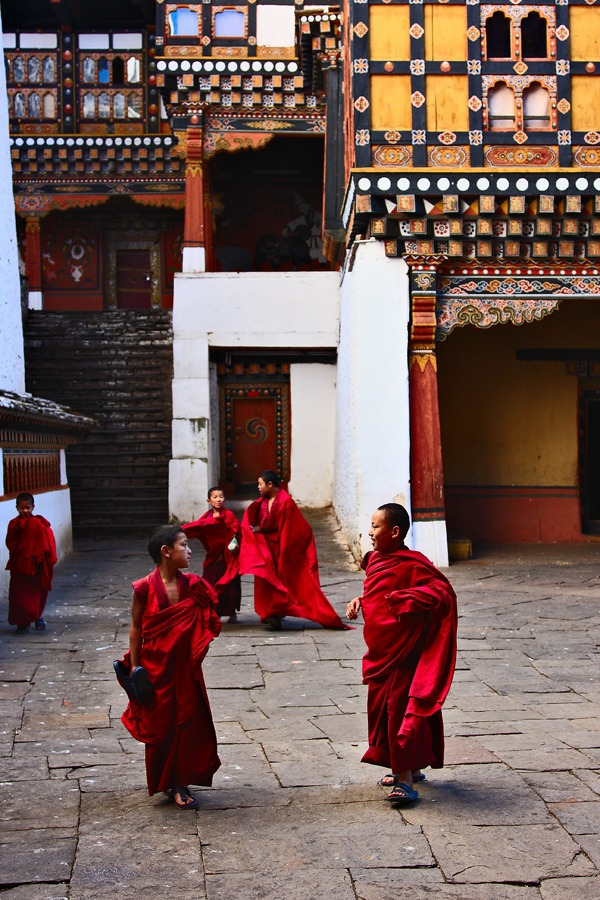
After saying bye to Arpan Kalita and confirming that we will re-group again in Guwahati to discuss our proposed project 'Alternative Experience', I decided to take a stroll of the market. Leh can be an interesting place when it comes to shopping. I have a deep penchant for Buddhist artifacts and junk memorabilia. Moreover, I wanted to check out stores available for buying or renting adventure equipment in Leh.
Read : A detailed interview with Arpan Kalita and his views on photography
I found a very interesting outdoors gear shop on the first floor of Mitsik Building, near Chowklang Gate in the main Bazaar called the Neo Leh. They practically had everything you needed for a trek or a bicycle or a motorcycle trip. While there are sprawling flea markets in pockets of Leh, the Tibetan Market is one place I would not like to miss. Mostly managed by the womenfolk, it is a good idea to first look around. Usually, they make a lot of fuss if you happen to be their first or last customer of the day and do not buy anything. However, a good gossip can earn you a good bargain. I had been mentally playing with the idea of taking home some metal statues, but since my exit flights out of Leh were never directly to home, I could not do much.

It is Japan's gift to Ladakh
The next day I decided to be a tourist in Leh for the eleventh time! It was a day I had no 'paycheck' work and had the car all to myself with a driver. I started with a visit to the Shanti Stupa. It is Japan's gift to Ladakh. Built-in 1991, Shanti Stupa is best visited in the afternoon and probably the day before you fly out of Leh. Now that is not a law but more a traveler's logic. You will get a stunning panoramic view of the valley and it helps you keep alive the emotional connect you might have accrued with Ladakh. Shanti Stupa was built to promote world peace commemorating 2500 years of Buddhism as a religion.

No matter how many times you visit Leh, it never ceases to awe you. It is the people for sure and the landscape. The mountain breed smile from a stranger who 'Julleys' you the old lady circling the prayer wheels, the cold wind dancing with the prayer flags and the smell of yak butter, you cannot be nut happy in Ladakh. I then decide to visit the Leh Palace, This old monument in Leh seems to be in a battered state but the views of the town are very assertive. It is believed that the Leh palace was designed to replicate the Potala Palace in Lhasa. History says that the Ladakhi royal family abandoned the palace when the Dogra army invade it in 1836 and moved to Stok, One particular place within the place that fascinates me is the Royal Shrine. It is on the third floor beside a small courtyard.

If you are in Leh you must not miss the Hall of Fame museum. It is a museum run by the Indian Army, located on the Leh-Kargil road, about 5 km from Leh. Dedicated to Indian soldiers who lost their lives in Indo-Pak wars, the museum is full of pictures of the wars. There is an entry fee of 25 INR per person and an additional 50 INR for photography.

The next stop was Spituk Monastery. There was something that always escaped me in Leh. The masked (Chham) dances of the New Year in Spituk Monastery. Spituk is an 11th-century architecture dedicated to goddess Tara. Although I had been lucky to witness masked dances elsewhere, I heard the one in Spituk has its own charm of authenticity. The masked dances provide a link between popular and mystical, hard to attain, Buddhism.
Well we had time today and my driver was enthusiastic, so we decided to stray away to Shey. Shey Palace and monastery is at an altitude of 11204 feet and is on the way to Thiksey and Hemis monasteries. Usually, there is a crowd in Shey but this time since it was beyond the tourist season. I was left alone and my pictures were devoid of tourist subjects. One thing about the monasteries in Ladakh is the stunning views they offer of the adjoining villages, mountains, valleys and towns or all of them. I guess no wonder I find the word ' panoramic view" exhaustively used to describe Ladakh visually.

Shey Palace was often called the summer retreat for the royalty of Ladakh. The climb to the Shey monastery from the main road, an arrangement of prayer wheels and the winding lane, all meant one thing, a reconciliation with the spiritual being.
Well, the day ended quite well. I asked Mehtab, my driver, who hails from Kargil, how he was doing. Always smiling he said, 'Thik Hain Saab', meaning all is well. Yes, indeed all is well that ends well. So sitting next to him, we started our drive back to Saboo village. The internet was strong surprisingly, so I decided to play some blues from my playlist on my Amazon Prime application.
"Everybody clap your hands
And don't you just love the way he sings?
Don't you know we're riding with the King?"
Eric Clapton sang 'Ridin' with the King' on the car's music system. We reached Saboo on time to wind up the day.
I don't know how many more times Ladakh will keep on calling me back. Sometimes I feel I needed to take a few years before I visit that place again. But fortuitously, Ladakh keeps bringing me back in. No wonder I revel in getting Leh'd in Ladakh so much. Not everyone gets what he wants. His Holiness, The Dalai Lama once said " Remember that sometimes not getting what you want is a wonderful stroke of luck."

My name is Amitabh Sarma and I am a storyteller. People fondly call me the “traveling pundit”; I humbly present myself as the “bearded traveling soul”.
I am also the co-founder of an experiential travel start-up, based out of Guwahati in Assam, Eventours Travels LLP. We started this company in 2015 . www.eventours.in
My blog site is www.beardedtravelingsoul.com

